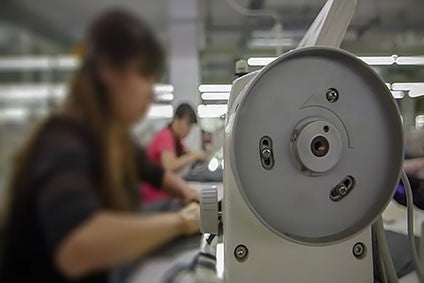In a webinar aimed at informing and advising on how best to relocate production, UKFT manufacturing consultant Elliot Barlow said brands were starting to consider whether the overall cost of bringing a finished product to the UK outweighed the cost and complexity of its local production. .
Barlow said that while UK brands had been planning to relocate over the past decade, the problem is now more widespread due to Brexit-related taxes, tariffs and duties, as there are a lot of additional costs that the company has to bear and those indirect costs eat into the margins.
Speaking at the webinar this morning (April 6), Barlow added that there are several other reasons brands are considering relocating production, including better quality control of the finished product; greater supply chain visibility, which can have moral and ethical benefits; reduction of the carbon footprint because the product has to travel a shorter distance before reaching the final consumer; and the convenience, flexibility and speed to market that local production allows.
But, he said, the complexity of relocating production can vary because with overseas manufacturers, brands often deal with an agent or middleman who deals with the different factories.
“British manufacturing and UK suppliers – the qualities they can offer – if the overall price is similar, then there’s more opportunity in the UK,” Barlow said. “Many of the brands we speak with are very interested in relocation but they may have been working with international suppliers for a long time so have become accustomed to working directly with an agent or representative and they may not have the skills and capabilities internals to deal with cut and finish plants and the necessary development steps.
“Businesses are interested, but there are key learnings that need to take place on how to work with UK suppliers.”
Some key factors, according to Barlow, should be considered before a plan to relocate some or all of production, including:
Does it add value to your products?
“It may be cheaper to source from abroad. But the perceived value of items produced in the UK is higher. Also, someone doing it overseas, in a factory where they get paid a small amount to do it because they have to, rather than because they want to, can mean it’s being done from bellicose manner, which will reduce the value of your items.
Specialties
“While one of the benefits of producing in the UK is that there are fewer production and dispatch steps, which reduces the risk of supply chain disruption if something like Covid were to happen, One of the advantages of producing overseas is that often factories are able to offer several production services.This may not be the case in the UK.A factory may specialize in the production of coats, but does not necessarily have the expertise to handle silk Choose each factory based on what it excels at.
Split services
“Avoid putting your eggs in one basket; If the one factory you rely on to do all your production fails, you risk your product getting to market on time. You may even rely on local producers for seasonal produce, but rely on cheaper overseas factories for your staples where there is no urgency on deadlines. This will allow you to speed up the time to market.
Folder size
“Overcharging a manufacturer could see them struggling to fulfill your order. Understand the capabilities and limitations of the factory so you can set realistic and achievable orders.
Earlier this year, data from the UK and EU revealed that Brexit was a lose-lose deal for the garment industry.








More Stories
🌱 Rail In Roanoke Fifth Anniversary + ‘Love Letters’ Production
Industrial production in South Korea contracts by 1.8% in September
PM Modi lays foundation stone for C-295 transport aircraft production plant